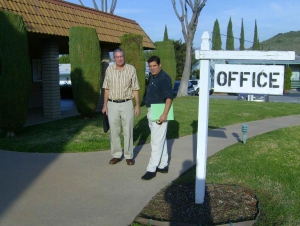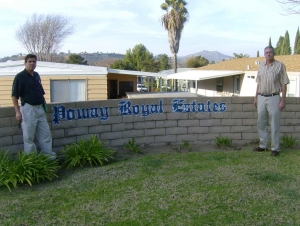 By D.R. Schwab
By D.R. Schwab
February 3, 2010 (Poway) -- It would be a first for Poway: Converting a city-owned mobile home park to resident ownership. For the second time in six years, it's something that residents of Poway Royal Mobile Estates, the City's largest mobile home park, are attempting to do.
Residents of the 501-acre, nearly 400-space sprawling park at 13300 Alpine Drive tried unsuccessfully once before, but still feel they've earned the right of first consideration in purchasing their park. Its estimated value is $40 million-plus. The City of Poway officially put the park up for open bid on Feb. 1.
The City of Poway has owned the park since 1991 and fought two lawsuits with Poway Royal residents over its administration (view a timeline of the park’s history). Poway City officials say park residents are more than welcome to bid: but they will be treated like any other prospective buyer.
The lawsuits and the bad blood between the mobile home park and the City, both of whom have new leadership, are ancient history. Both sides agree the objective now is simply to move forward for the benefit of all.
But residents are as clear as the city is uncertain on which direction to head.
 “We'd like to see this as a resident-owned park. That's the goal,” said Sonny Tirone, current president of Poway Royal's Homeowner's Association. Tirone cited numerous reasons for seeking autonomy, with rent and fiscal control topping the list. “Right now it's a mandatory yearly rent increase and they've always been in the red every year since they've owned the park,” he said of the City.
“We'd like to see this as a resident-owned park. That's the goal,” said Sonny Tirone, current president of Poway Royal's Homeowner's Association. Tirone cited numerous reasons for seeking autonomy, with rent and fiscal control topping the list. “Right now it's a mandatory yearly rent increase and they've always been in the red every year since they've owned the park,” he said of the City.
Tirone noted the necessary number of signatures — 67 percent — from park residents interested in purchasing the park has been acquired to set the process in motion to submit a purchase bid. “We’re almost there,” he said. “We’re working with the finance people right now.”
He conceded that converting a mobile home park to resident ownership is “not a simple process.” But he added it can, and has, been done. ”There are companies specifically designed to help with the conversion process,” he said.
Tirone's colleague on the park’s homeowner's association, Keith Harris, pointed out that park residents have been trying to buy the park for years. Harris said experience elsewhere has proven it’s the best way to go. “Almost across the board, in any of these conversions, they look better, they're better maintained, when the residents own the park,” he observed.
The city of Poway is just as insistent on its bargaining position. “We're offering the park on the open market; we're looking for a fair-market purchase,” said Penny Riley, interim city manager. “The property is an asset of the city of Poway. It is not possible to discount a price to the homeowner's association, because that would constitute a gift of public funds.”
Some Poway Royal residents, like Morrie Itzkowitz, past homeowner's association president and a 12-year resident, are convinced the city's being less than forthcoming in following through on past implied commitments to park residents.
“The park went to the City and asked if the City would help us buy our park and the City said, 'Sure, no problem, we'll help you,' ” he said. “The City decided to buy the park and then sell it back to us; it never happened.”
Dena Fuentes, Poway's director of redevelopment and community services, said Itzkowitz has a misperception of past dealings between the City and park residents. “We never did offer to sell the park to the residents, never entered into an agreement to sell it to them,” she said, adding it makes perfect sense for the City, even in this economy, to test the open market. “The residents have an opportunity, like any other buyer, to place an offer on the park,” she said.
The listing period for bids on Poway Royal Mobile Estates closes March 1. All purchase offers received will be evaluated after that date.
Fuentes said residents unsuccessfully sued the City when the City tried to save an estimated $400,000 to $500,000 annually, depending on the interest rate, by refinancing bonds on the park. She said residents feared that if the City successfully refinanced bonds, “that would limit their ability to purchase the park in the future…We prevailed in that lawsuit,” she added. “Now that the lawsuits have clearly aligned with the city, we’re either going to refinance the bonds — or sell it to whom we choose to sell it to.”
Whoever purchases the park will be required by the city of Poway to perform $1.8 million in capital improvements including clubhouse renovations, infrastructure improvements, landscape and irrigation improvements and facilities renovations.
“We’re willing to take a lower price in exchange for the cost of the renovation,” said Fuentes adding the new owner is going to be required to not to raise rents for two years, starting January 2011, while capital improvements are under construction to accommodate resident inconvenience.
After that, Fuentes added, future rent increases will be capped at 5 percent or the CPI (Consumer Price Index), whichever is less. “In exchange, we’re willing to finance or carry a $10 million note on the property with an interest only for 20 years,” she said. “We’re willing to do this to provide some long-term rent protection for the existing residents and to ensure the park is renovated and well maintained.”
What happens if a satisfactory buyer is not found for Poway Royal by the City? Said Fuentes: “We’ve told the council that if we do not find a buyer that meets the City’s goals, then we’ll continue to hold the park and not sell it and look at refinancing the bonds.”
Noting it’s a trend that mobile home parks throughout San Diego County are being sold and taken over by residents, Itzkowitz pointed out Poway Royal's fate is in the City's hands. “The City has the power to do what they want,” he said. “They can either make it very simple, or very difficult. They're not making it simple for us with all their restrictions and requirements.”
If Poway Royal residents succeed in purchasing their park, Tirone said it will be run by a cooperative just like the homeowners’ association now in place. Harris said there will be at least one major difference. “The ones who want to continue to rent will rent from the coop, who happen to be everybody here, as opposed to the City,” he said.
What’s the worst-case scenario? “The City continues as an absentee landlord and doesn’t fulfill its commitments, and they let the place run down and sell it to someone eventually down the road and they bulldoze the place down,” Tirone said.
The best-case in Tirone’s view will be if the residents’ upcoming bid to buy the park from the city succeeds. If that happens, he contends, little noticeably will change for park residents. “The City is not really here,” he argued. “We’ll hire a management company just like the City. Basically, we’ll take the place of the city.”
Are Poway Royal residents content with their City's stance on not giving them preferential treatment in selling the park to them?
“There's not much you can do when your neighborhood's considered a product for sale,” concluded Tirone.








Recent comments